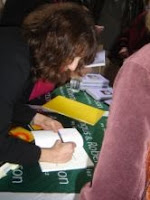I think at heart I’ve always been a rock and roll star. I can’t pick up my guitar or sing along to my favourite tunes without visualising myself on-stage before a rapturous crowd. But it irritates me that the words I’m singing along to are often dumb. Sung or spoken with enough conviction, almost anything can move a crowd. Bush and slam poetry sometimes makes emotive appeal and delivery its end goal – taking simple sentences or stream of consciousness outpourings and speaking them with punch.
I’ve attended a couple of events recently that have had me picturing the spoken poem on the page and no matter how powerful the performance, finding it wanting. I’ve done the same with music lyrics and been similarly disappointed, even with my very favourite songs. Neither is an appropriate response, but being a wordgirl, I just can’t help myself. However, I can’t let go of the notion that poetry is a natural medium for performance, and that the best way of getting people, especially young people, interested in poetry is to perform it, with enough pizzazz for anyone – even the person who claims to ‘not be into poetry’ or to ‘not have time to read’ (yes, that puts a shiver down my spine too), to feel the power of what you’ve written.
Is there really a disconnect between performance poetry (that is, poetry written specifically for the purposes of performance, rather than for distribution on the page), and traditional poetry (that is, poetry written to be read on page rather than performed)? Are the two mutually exclusive? I think not.
The best performances, for me at least, are those which take what works perfectly on the page, using imagery and subtlety, and presents it out loud with rich nuances that might not have hit me on my first few readings, or ever. Of course the performance of poetry is one of the oldest of art forms, going back to Gilgamesh, to the Ramayana, to Homer. It tugs at something rather deep in our preliterate psyche. Getting the listener to feel that tug, and recognise the meaning being created is what a good poetry performance is all about.
I also think that the best performances morph what is on the page into a new medium. It turns the verbal into the visual, showing what kind of power words can have. The best poems for performance have an innate musicality, using alliteration, rhythm, rhyme and assonance to further add meaning. As the great Basil Bunting put it, it is only when ‘sounded’ that this rhythm reveals its full power. Bunting should know. He was one of the great poetry performers, charging his words with the power of a Shakespearean actor to take the audience deep into the heart of his meaning, effortlessly and instantly. The performances draw the reader into the intimacy of the work, breaking open the familiar so that it appears completely, surprisingly new. Of course that’s what great poetry does on the page too, but it takes a commitment on the part of the reader to get there.
Gaining that sort of commitment from a reader isn’t always easy. Ask any publisher who sells poetry. Ask any poet who publishes their work.
Performance is something entirely different. When done properly, with a poem that truly merits more, rather than less, commitment on the part of a reader, the performance can become its own work of art – like the musical symphony, stirring something inchoate and deep within a listener. It draws a crowd, and challenges perceptions. It can work, and should work, in conjunction with the publication – to bring in readers, and to compel people to explore their own clichés and assumptions about themselves. It opens doors.
This blog originally appeared on the BeWrite Books Blog.






